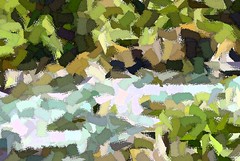Creation as Emergent
Warning: Theological jiber-jab ahead. Written for my class with Dr. Hicks.
After the wonderful creation motif written in Genesis, we witness a crisis in the story. Before we beginning thinking about the crisis we term “the fall” may we profit from discussions about the world inside the garden. Its maker deemed creation “good” and in the end (the 7th day) the Creator said it was “very good.” We would be wise to note that Hebrews and Greeks understood words very different. In this case, the word “good” could mean perfect in a Greek’s mind while a Hebrew would interpret the term as robust, dynamic, and room for growth. So was creation not complete after the 6th day? Well, we could answer this both yes and no. Yes it was complete in the sense that God rested and enjoyed what he created. Between humanity, creation and the triune God there was peace, harmony, tenderness and love in the garden (otherwise known as shalom). We can also answer “no” to the question by affirming that God wanted creation to emerge into something beautiful on its own. The purpose of humanity was to work along side with God as co-creators, caretakers and apprentices in the world. So we have a story where creativity is being developed right before the eyes of God and his creation in hopes that it will continue. But in our story, humanity as we know it does not continue in this creative goodness. Even though the world and humans and everything that has God’s fingerprints on it are still considered good, it is not where it needs to be. So what happened?
The crisis in our story happens between humans and their creator. As most of us remember in the story a serpent tempts Eve to eat from the tree of knowledge of good and evil. While most would say that humans did not follow the “Garden Rules” I would say that it is much bigger than that. Humanity is tempted to think that God does not trust them and is withholding valuable stuff, whether knowledge or materials or experiences. Likewise, the breach in their relationship continues to develop into stronger resistance against God’s love and community. Furthermore, the crisis evolves into a culmination of evil that puts the proposed goodness at risk. Throughout the first few chapters in Genesis, humans experience pain, loss, death, war, greed, ugliness, betrayal, chaos, and hate, all of which was never intended to grow from the initial goal of creation. Healing is needed as human’s relationship with nature, God and each other has been mangled.
But the creation narrative does not end with a single event in the garden or God seizing as it were creation. Going back to the term good in the mind of a Hebrew brings us to the idea of a God that seeks for creation to move forward with its original intent: co-creating with the Creator and bringing balance and shalom back into the world we experience. God created a vibrant world, not a static world, to dance, move, create new ways of being so that goodness would grow and become something bigger and better than experienced in the garden. Thus our role in this creation is to create (co-create) reconciliation, goodness, hope, love from the clay we each use, however different your clay is from mine. May our community embody this creativity out among the fields of creation as God draws us closer into the Kingdom of God.
After the wonderful creation motif written in Genesis, we witness a crisis in the story. Before we beginning thinking about the crisis we term “the fall” may we profit from discussions about the world inside the garden. Its maker deemed creation “good” and in the end (the 7th day) the Creator said it was “very good.” We would be wise to note that Hebrews and Greeks understood words very different. In this case, the word “good” could mean perfect in a Greek’s mind while a Hebrew would interpret the term as robust, dynamic, and room for growth. So was creation not complete after the 6th day? Well, we could answer this both yes and no. Yes it was complete in the sense that God rested and enjoyed what he created. Between humanity, creation and the triune God there was peace, harmony, tenderness and love in the garden (otherwise known as shalom). We can also answer “no” to the question by affirming that God wanted creation to emerge into something beautiful on its own. The purpose of humanity was to work along side with God as co-creators, caretakers and apprentices in the world. So we have a story where creativity is being developed right before the eyes of God and his creation in hopes that it will continue. But in our story, humanity as we know it does not continue in this creative goodness. Even though the world and humans and everything that has God’s fingerprints on it are still considered good, it is not where it needs to be. So what happened?
The crisis in our story happens between humans and their creator. As most of us remember in the story a serpent tempts Eve to eat from the tree of knowledge of good and evil. While most would say that humans did not follow the “Garden Rules” I would say that it is much bigger than that. Humanity is tempted to think that God does not trust them and is withholding valuable stuff, whether knowledge or materials or experiences. Likewise, the breach in their relationship continues to develop into stronger resistance against God’s love and community. Furthermore, the crisis evolves into a culmination of evil that puts the proposed goodness at risk. Throughout the first few chapters in Genesis, humans experience pain, loss, death, war, greed, ugliness, betrayal, chaos, and hate, all of which was never intended to grow from the initial goal of creation. Healing is needed as human’s relationship with nature, God and each other has been mangled.
But the creation narrative does not end with a single event in the garden or God seizing as it were creation. Going back to the term good in the mind of a Hebrew brings us to the idea of a God that seeks for creation to move forward with its original intent: co-creating with the Creator and bringing balance and shalom back into the world we experience. God created a vibrant world, not a static world, to dance, move, create new ways of being so that goodness would grow and become something bigger and better than experienced in the garden. Thus our role in this creation is to create (co-create) reconciliation, goodness, hope, love from the clay we each use, however different your clay is from mine. May our community embody this creativity out among the fields of creation as God draws us closer into the Kingdom of God.





<< Home